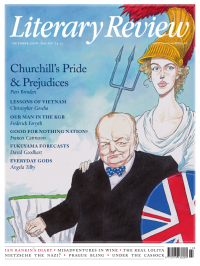Sally Bayley
Plath’s Passions
The Letters of Sylvia Plath, Volume II: 1956–1963
By Peter K Steinberg & Karen V Kukil (edd)
Faber & Faber 1,025pp £35
Letters can be the most ordinary of documents, but a skilled letter-writer can adopt many guises. Faber’s second published volume of Sylvia Plath’s letters provides more evidence that much of the delight of writing letters for Plath was the opportunity to practise tones and registers, voices and attitudes, political and private personae.
From the age of twenty-four to her death at thirty – the period covered in this volume – Plath was consummately involved in life-management. There was no one busier. The book opens with Plath recently married to Ted Hughes and hard at work launching herself into Anglo-American literary culture. Her new life with Hughes is central to this mission, as she explains in a 1957 letter to the American poet and art historian Lynne Lawner:
Ted being my husband for almost a year now: a poet, like they say, but Yorkshire, not Welsh & unlike Dylan in much more than poetry. It would be too impossible to go into the vision clairvoyance, etc. involved in our life & the amazing way it’s worked out: suffice it to say I can’t remember a time I wasn’t married to him.
Ted, she assures Lawner, will ‘daze them all’ with his talent, which will direct and confirm her blessed future; her confidence in their creative coupling is almost visionary. Marriage must often be praised, never more so than in the 230 letters to her mother that dominate this volume. Writing

Sign Up to our newsletter
Receive free articles, highlights from the archive, news, details of prizes, and much more.@Lit_Review
Follow Literary Review on Twitter
Twitter Feed
'A charming and amusing personal history'
Don't miss this brilliant @Lit_Review review of #WorldCupFever 👇
@KuperSimon's must-read footballing journey in nine tournaments is out now ⚽️🏆
Michael Taylor - The Beautiful Game
Michael Taylor: The Beautiful Game - World Cup Fever: A Footballing Journey in Nine Tournaments by Simon Kuper; Th...
literaryreview.co.uk
In the summer of 1918, the Caspian port of Baku played host to a remarkable group of Allied soldiers, sent to defend oil wells against the Ottomans.
Anna Reid recounts their escapades.
Anna Reid - Mission Impossible
Anna Reid: Mission Impossible - Mavericks: Empire, Oil, Revolution and the Forgotten Battle of World War One by Nick Higham
literaryreview.co.uk
Alfred, Lord Tennyson is practically a byword for old-fashioned Victorian grandeur, rarely pictured without a cravat and a serious beard.
Seamus Perry tries to picture him as a younger man.
Seamus Perry - Before the Beard
Seamus Perry: Before the Beard - The Boundless Deep: Young Tennyson, Science, and the Crisis of Belief by Richard Holmes
literaryreview.co.uk